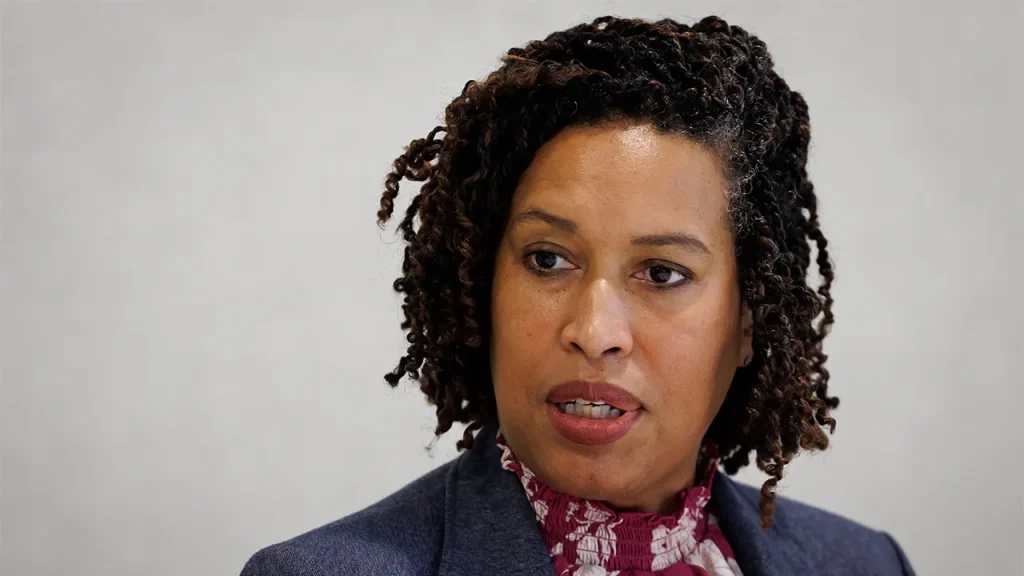D.C. Mayor Bowser Expresses Legal Concerns Over National Guard Deployments
In a thoughtful examination of federal authority versus local governance, Washington, D.C. Mayor Muriel Bowser recently voiced her skepticism about the legality of deploying the National Guard to address crime in American cities. Speaking at the Fortune Most Powerful Women conference in Washington, Mayor Bowser plainly stated her position: “I don’t think it’s legal, let me start there, for the National Guard to police Americans on American soil.” Her statement reflects growing tension between federal and local approaches to public safety and raises important questions about the appropriate use of military forces in domestic contexts. The mayor’s comments come at a time when President Trump has increased federal law enforcement presence in several Democratic-led cities, including the nation’s capital, as part of his initiative to reduce crime rates.
Mayor Bowser took care to explain the unique situation of Washington, D.C., where the command structure differs significantly from other parts of the country. Unlike in states where governors have authority to activate their National Guard units, the D.C. National Guard reports directly to the president. “While I can request the National Guard, they are completely federally operated. And so D.C. is a little different than in other places for the D.C. National Guard,” Bowser explained. This distinction highlights the complicated governance structure of the District of Columbia, which lacks the autonomy enjoyed by states. The mayor emphasized that in traditional circumstances, the Guard is utilized for emergency response and managing large-scale events, not for enforcing local laws. This principle of separation between military forces and domestic policing has deep roots in American governance philosophy, designed to prevent the militarization of law enforcement.
The recent months have witnessed a significant increase in federal presence across D.C., with hundreds of federal agents and National Guard troops deployed to the district’s streets as part of what some describe as a federal takeover. This pattern hasn’t been limited to the capital; similar deployments have occurred in Chicago and Los Angeles, where federal troops were sent to address issues ranging from crime reduction to responding to immigration-related protests. These deployments have not gone unchallenged. In Illinois, both Chicago and the state government took legal action against the federal government, resulting in a partial ruling that returned some National Guard control to federal authorities while blocking troop deployment on Chicago’s streets. Similarly, California officials filed suit over federal deployments responding to anti-ICE protests in Los Angeles, where National Guard members were sent following immigration raids targeting migrant workers.
The legal challenges to these deployments reflect deep concerns about federalism and the appropriate balance of power between national and local governments. The traditional American system of governance typically reserves law enforcement matters to state and local authorities, with federal intervention being limited and narrowly defined. This principle has been increasingly tested in recent years, with federal authorities asserting broader powers to intervene in what have historically been local matters. The situation becomes particularly complex in Washington, D.C., where the lack of statehood creates unique vulnerabilities to federal overreach. The district’s special status means that its residents and elected officials have fewer protections against federal intervention than citizens of states, whose governments can assert sovereignty under the Constitution’s federal system.
Mayor Bowser’s concerns extend beyond the immediate legal questions to broader implications for American democracy. “We should all be concerned about the military being used because it’s a slippery slope,” she cautioned during her remarks. This perspective touches on fundamental principles that have guided American governance since its founding – particularly the separation of military and civilian affairs and the careful limits placed on domestic use of military forces. The Posse Comitatus Act of 1878, which limits federal military personnel from acting as domestic law enforcement, reflects long-standing American wariness about military involvement in civilian matters. Bowser articulated this concern clearly: “You use it for crowd control one day, or presence the next day — it’s not a long jump to using it in other ways that could interfere with the very nature of American democracy.”
These developments represent a significant moment in the ongoing dialogue about federalism, public safety, and constitutional governance in America. As cities and states grapple with complex challenges around crime, immigration, and public order, the question of who should respond – and with what tools – remains contentious. The legal battles unfolding in courtrooms across the country will likely shape the boundaries of federal power for years to come. For residents of Washington, D.C., the stakes are particularly high, as their unique status means they experience federal power more directly than most Americans. Mayor Bowser’s voice in this conversation represents not just her constituents but also raises important questions about the nature of democracy and self-governance in contemporary America. As these disputes continue to unfold, they remind us that the balance of power between federal and local authorities remains a vital and evolving aspect of American constitutional democracy.















